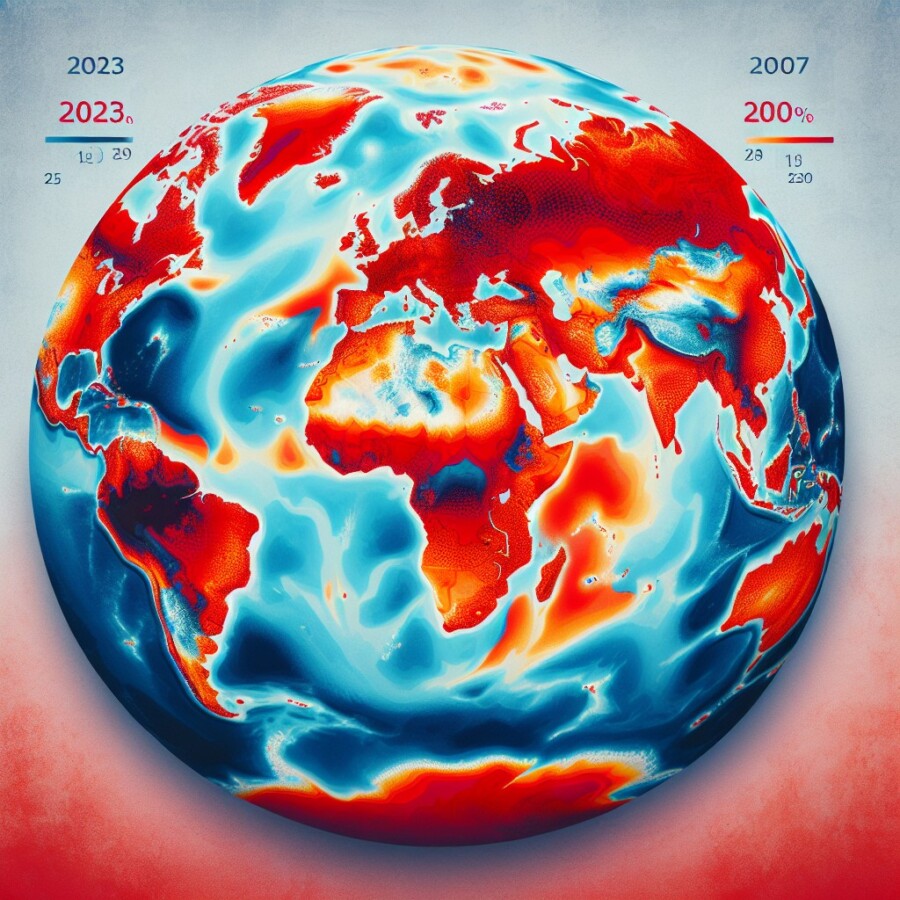The year 2023 has been confirmed as the hottest year on record, surpassing previous records due to human-caused climate change and the El Niño weather event. The European Union’s climate service reported that 2023 was about 1.48C warmer than the long-term average before the widespread burning of fossil fuels began. BBC analysis shows that almost every day since July has seen a new global air temperature high for that time of year, and sea surface temperatures have also reached unprecedented levels. The UK also experienced its second warmest year on record in 2023. These record-breaking temperatures are bringing the world closer to exceeding key international climate targets.
What is particularly striking about 2023 is not only that it broke previous records, but by how much it surpassed them. The margin by which these records were broken is astonishing, considering they represent global averages. The world has become significantly warmer over the past century due to the release of greenhouse gases into the atmosphere. However, 2023 being the hottest year on record was not predicted by major scientific bodies, as the Earth’s climate is complex and difficult to forecast.
During the first few months of 2023, only a few days broke air temperature records. However, in the second half of the year, there was an almost unbroken streak of daily temperature records. More than 200 days saw a new daily global temperature record for that time of year. This temperature increase is mainly attributed to the rapid onset of El Niño conditions, which added to the long-term human-caused warming. El Niño is a natural event where warmer surface waters in the East Pacific Ocean release additional heat into the atmosphere. However, the full effects of El Niño were not expected until early 2024, leaving scientists uncertain about the reasons behind the exceptional warmth in 2023.
The record-breaking warmth in 2023 was felt worldwide. Almost all regions of the globe were warmer than the 1991-2020 average, which itself was nearly 0.9C warmer than pre-industrial levels. This global warmth intensified extreme weather events, such as heatwaves, wildfires, droughts, and floods, in various parts of the world. These events occurred on a larger scale and at unusual times of the year, causing significant destruction and loss of life.
In addition to air temperatures, other indicators of climate change also reached record levels in 2023. Antarctic sea-ice reached a record low, glaciers in North America and Europe experienced extreme melting, and the world’s sea surface temperature reached its highest recorded level, leading to multiple marine heatwaves. The ocean surface has been breaking records since May 4th, 2023.
Looking ahead to 2024, it is uncertain whether it will be warmer than 2023 due to the unpredictable behavior of the current El Niño. However, there is a possibility that 2024 may surpass the key 1.5C warming threshold for the entire year, which was
Original news source: 2023 confirmed as world’s hottest year on record (BBC)
🎧 Listen:
Slow
Normal
Fast
📖 Vocabulary:
| 1 | surpassed | Exceeded or went beyond |
| 2 | climate | The weather conditions prevailing in an area in general or over a long period |
| 3 | fossil fuels | Natural resources such as coal, oil, and natural gas, derived from the remains of ancient living organisms |
| 4 | unprecedented | Never before known or experienced |
| 5 | targets | Goals or levels that are aimed for or need to be achieved |
| 6 | margin | The amount by which something is won or lost |
| 7 | greenhouse gases | Gases in Earth’s atmosphere that trap heat and contribute to warming |
| 8 | forecast | To predict or estimate a future event or trend |
| 9 | streak | A continuous series of events or occurrences |
| 10 | onset | The beginning or arrival of something |
| 11 | attributed | Considered to be caused by |
| 12 | intensified | Made more severe or extreme |
| 13 | destruction | The act of causing great damage or harm |
| 14 | indicators | Measures or signs that something is present or true |
| 15 | threshold | A critical point or level that is considered dangerous or critical to exceed |
Group or Classroom Activities
Warm-up Activities:
– News Summary
Instructions: In pairs or small groups, students will read the article and then summarize the main points in their own words. They should focus on the key information, such as the confirmation of 2023 as the hottest year on record, the role of human-caused climate change and El Niño, and the global impact of the record-breaking temperatures.
– Opinion Poll
Instructions: Students will be divided into groups and given a statement related to climate change, such as “The world needs to take immediate action to combat climate change.” Each group will discuss the statement and then take a poll within their group to determine how many agree or disagree. Afterward, each group will present their findings to the class and explain their reasoning.
– Sketch It
Instructions: In pairs, students will choose a specific event mentioned in the article, such as a heatwave or a marine heatwave, and sketch a visual representation of it. They should include key elements and details that capture the essence of the event. Afterward, they will present their sketches to the class and explain their choices.
– Headline Creation
Instructions: Students will work individually or in pairs to create attention-grabbing headlines related to the article. They should focus on capturing the main message or impact of the record-breaking temperatures in 2023. Afterward, they will share their headlines with the class and discuss their choices.
– Future Predictions
Instructions: In pairs or small groups, students will discuss and make predictions about the future impact of climate change based on the information in the article. They should consider possible scenarios and consequences, as well as potential actions that could be taken to mitigate the effects. Afterward, each group will share their predictions with the class and engage in a discussion about the different perspectives.
🤔 Comprehension Questions:
1. What factors contributed to 2023 being the hottest year on record?
2. How much warmer was 2023 compared to the long-term average before the burning of fossil fuels?
3. How did the UK’s temperatures in 2023 compare to previous years?
4. What is the main reason behind the temperature increase in the second half of 2023?
5. Why were major scientific bodies not able to predict that 2023 would be the hottest year on record?
6. How did the record-breaking warmth in 2023 impact extreme weather events worldwide?
7. What are some indicators of climate change that reached record levels in 2023?
8. Is it possible that 2024 will be even warmer than 2023?
Go to answers ⇩
🎧✍️ Listen and Fill in the Gaps:
The year 2023 has been confirmed as the hottest year on (1)______, surpassing previous records due to human-caused climate change and the El Niño weather event. The European Union’s climate service reported that 2023 was about 1.48C (2)______ than the long-term average before the widespread burning of fossil fuels (3)______. BBC analysis shows that almost every day since July has seen a new global air temperature high for that time of year, and sea surface temperatures have also reached unprecedented levels. The UK also experienced its (4)______ warmest year on record in 2023. These record-breaking temperatures are bringing the world closer to exceeding key international climate targets.
What is particularly striking about 2023 is not only that it broke (5)______ records, but by how much it surpassed them. The margin by which these records were broken is astonishing, considering they (6)______ global averages. The world has become significantly warmer over the past century due to the release of greenhouse gases into the atmosphere. However, 2023 being the hottest year on record was not predicted by (7)______ scientific bodies, as the Earth’s (8)______ is complex and difficult to forecast.
During the first few months of 2023, only a few days broke air temperature records. However, in the second half of the year, there was an almost unbroken streak of daily temperature records. More than 200 days saw a new daily global temperature record for that time of year. This temperature increase is mainly attributed to the rapid onset of El Niño conditions, which (9)______ to the long-term human-caused warming. El Niño is a natural event where warmer surface waters in the East Pacific Ocean release additional heat into the atmosphere. However, the full effects of El Niño were not expected until early 2024, leaving scientists uncertain about the reasons behind the exceptional warmth in 2023.
The record-breaking warmth in 2023 was felt (10)______wide. Almost all regions of the globe were warmer than the 1991-2020 average, which itself was nearly 0.9C warmer than pre-industrial (11)______. This global warmth intensified extreme weather events, such as heatwaves, wildfires, droughts, and floods, in (12)______ parts of the world. These events occurred on a larger (13)______ and at unusual times of the year, causing significant destruction and loss of life.
In addition to air temperatures, other indicators of climate change also reached record levels in 2023. Antarctic sea-ice reached a record low, glaciers in North America and Europe experienced extreme melting, and the world’s sea surface temperature reached its highest recorded level, leading to multiple marine (14)______. The ocean surface has been breaking records since May 4th, 2023.
Looking ahead to 2024, it is uncertain whether it will be warmer than 2023 due to the (15)______ behavior of the (16)______ El Niño. However, there is a possibility that 2024 may surpass the key 1.5C warming threshold for the entire year, which was
Go to answers ⇩
💬 Discussion Questions:
Students can ask a partner these questions, or discuss them as a group.
1. How do you feel about the fact that 2023 was the hottest year on record?
2. Do you think the record-breaking temperatures in 2023 are a cause for concern? Why or why not?
3. What impact do you think the record-breaking temperatures in 2023 had on extreme weather events around the world?
4. How do you think the record-breaking warmth in 2023 will affect future climate change policies and actions?
5. What steps do you think should be taken to address the issue of climate change in light of the record-breaking temperatures in 2023?
6. How do you think the record-breaking temperatures in 2023 will impact future generations?
7. Do you think the current El Niño event is solely responsible for the record-breaking temperatures in 2023? Why or why not?
8. How do you think the record-breaking temperatures in 2023 will impact the global economy?
9. What measures do you think individuals can take to mitigate the effects of climate change in their own lives?
10. How do you think the record-breaking temperatures in 2023 will impact wildlife and ecosystems around the world?
11. What role do you think governments and international organizations should play in addressing the issue of climate change in light of the record-breaking temperatures in 2023?
12. How do you think the record-breaking temperatures in 2023 will impact agriculture and food production?
13. Do you think the record-breaking temperatures in 2023 will lead to more frequent and severe natural disasters? Why or why not?
14. How do you think the record-breaking temperatures in 2023 will impact global migration patterns?
15. What actions do you think should be taken to prevent future years from surpassing the key 1.5C warming threshold?
Individual Activities
📖💭 Vocabulary Meanings:
Match each word to its meaning.
Words:
1. surpassed
2. climate
3. fossil fuels
4. unprecedented
5. targets
6. margin
7. greenhouse gases
8. forecast
9. streak
10. onset
11. attributed
12. intensified
13. destruction
14. indicators
15. threshold
Meanings:
(A) Gases in Earth’s atmosphere that trap heat and contribute to warming
(B) To predict or estimate a future event or trend
(C) The weather conditions prevailing in an area in general or over a long period
(D) Measures or signs that something is present or true
(E) Exceeded or went beyond
(F) Made more severe or extreme
(G) A continuous series of events or occurrences
(H) A critical point or level that is considered dangerous or critical to exceed
(I) The amount by which something is won or lost
(J) Natural resources such as coal, oil, and natural gas, derived from the remains of ancient living organisms
(K) Considered to be caused by
(L) The beginning or arrival of something
(M) The act of causing great damage or harm
(N) Never before known or experienced
(O) Goals or levels that are aimed for or need to be achieved
Go to answers ⇩
🔡 Multiple Choice Questions:
1. Why was 2023 the hottest year ever recorded?
(a) The European Union’s climate service predicted it
(b) The world has been getting warmer over the past hundred years
(c) Climate change caused by humans and El Niño
(d) The average temperature has already gone up by 0.9C
2. What is El Niño?
(a) A type of greenhouse gas in the air
(b) A record-breaking heatwave
(c) The lowest ice level in Antarctica
(d) When the Pacific Ocean gets warmer and releases more heat into the air
3. How did scientists feel about 2023 being the hottest year?
(a) They didn’t predict it would be the hottest year
(b) They were confident it would be the hottest year
(c) They were unsure about the effects of El Niño
(d) They expected 2024 to be even hotter
4. When did the global air temperature start reaching new highs?
(a) Since the beginning of 2023
(b) Since May 4th, 2023
(c) Since before people started using a lot of fossil fuels
(d) Since July of 2023
5. What were some extreme weather events that happened more often in 2023?
(a) Hurricanes, blizzards, earthquakes, and tsunamis
(b) Heatwaves, wildfires, droughts, and floods
(c) Tornadoes, hailstorms, thunderstorms, and avalanches
(d) Snowstorms, landslides, hurricanes, and earthquakes
6. How did the ocean react to the high temperatures in 2023?
(a) It had marine heatwaves and was the hottest it’s ever been
(b) It froze and caused a decrease in sea levels
(c) It remained the same temperature as previous years
(d) It caused a rise in sea levels and flooding
7. What is the important warming limit that 2024 might exceed?
(a) 0.9C
(b) 2.0C
(c) 1.5C
(d) 1.0C
8. How did the high temperatures in 2023 affect the UK?
(a) It had the lowest ice level in Antarctica
(b) It was the second hottest year ever recorded
(c) It caused extreme weather events like heatwaves and floods
(d) It broke all the previous temperature records
Go to answers ⇩
🕵️ True or False Questions:
1. The record-breaking temperatures in 2023 are bringing the world closer to exceeding key international climate targets.
2. Almost every day since July of 2023 has not seen a new global air temperature high for that time of year.
3. The European Union’s climate service reported that 2023 was about 1.48C warmer than the long-term average.
4. The UK experienced its second warmest year on record in 2023.
5. Other indicators of climate change, such as Antarctic sea-ice, glaciers, and the world’s sea surface temperature, also reached record levels in 2023.
6. Sea surface temperatures in 2023 did not reach unprecedented levels.
7. The record-breaking warmth in 2023 did not intensify extreme weather events such as heatwaves, wildfires, droughts, and floods.
8. The year 2023 has not been confirmed as the hottest year on record.
Go to answers ⇩
📝 Write a Summary:
Write a summary of this news article in two sentences.
Check your writing now with the best free AI for English writing!
Writing Questions:
Answer the following questions. Write as much as you can for each answer.
Check your answers with our free English writing assistant!
1. What factors contributed to 2023 being the hottest year on record?
2. Why were major scientific bodies not able to predict that 2023 would be the hottest year on record?
3. How did the rapid onset of El Niño conditions contribute to the record-breaking warmth in 2023?
4. How did the record-breaking warmth in 2023 affect extreme weather events around the world?
5. What other indicators of climate change reached record levels in 2023, aside from air temperatures?
✅ Answers
🤔✅ Comprehension Question Answers:
1. The factors that contributed to 2023 being the hottest year on record were human-caused climate change and the El Niño weather event.
2. 2023 was about 1.48C warmer than the long-term average before the burning of fossil fuels.
3. The UK experienced its second warmest year on record in 2023.
4. The temperature increase in the second half of 2023 was mainly attributed to the rapid onset of El Niño conditions, which added to the long-term human-caused warming.
5. Major scientific bodies were not able to predict that 2023 would be the hottest year on record because the Earth’s climate is complex and difficult to forecast.
6. The record-breaking warmth in 2023 intensified extreme weather events worldwide, leading to heatwaves, wildfires, droughts, and floods that caused significant destruction and loss of life.
7. Some indicators of climate change that reached record levels in 2023 were Antarctic sea-ice reaching a record low, extreme melting of glaciers in North America and Europe, and the world’s sea surface temperature reaching its highest recorded level, leading to multiple marine heatwaves.
8. It is uncertain whether 2024 will be even warmer than 2023 due to the unpredictable behavior of the current El Niño, but there is a possibility that it may surpass the key 1.5C warming threshold for the entire year.
Go back to questions ⇧
🎧✍️✅ Listen and Fill in the Gaps Answers:
(1) record
(2) warmer
(3) began
(4) second
(5) previous
(6) represent
(7) major
(8) climate
(9) added
(10) world
(11) levels
(12) various
(13) scale
(14) heatwaves
(15) unpredictable
(16) current
Go back to questions ⇧
📖💭✅ Vocabulary Meanings Answers:
1. surpassed
Answer: (E) Exceeded or went beyond
2. climate
Answer: (C) The weather conditions prevailing in an area in general or over a long period
3. fossil fuels
Answer: (J) Natural resources such as coal, oil, and natural gas, derived from the remains of ancient living organisms
4. unprecedented
Answer: (N) Never before known or experienced
5. targets
Answer: (O) Goals or levels that are aimed for or need to be achieved
6. margin
Answer: (I) The amount by which something is won or lost
7. greenhouse gases
Answer: (A) Gases in Earth’s atmosphere that trap heat and contribute to warming
8. forecast
Answer: (B) To predict or estimate a future event or trend
9. streak
Answer: (G) A continuous series of events or occurrences
10. onset
Answer: (L) The beginning or arrival of something
11. attributed
Answer: (K) Considered to be caused by
12. intensified
Answer: (F) Made more severe or extreme
13. destruction
Answer: (M) The act of causing great damage or harm
14. indicators
Answer: (D) Measures or signs that something is present or true
15. threshold
Answer: (H) A critical point or level that is considered dangerous or critical to exceed
Go back to questions ⇧
🔡✅ Multiple Choice Answers:
1. Why was 2023 the hottest year ever recorded?
Answer: (c) Climate change caused by humans and El Niño
2. What is El Niño?
Answer: (d) When the Pacific Ocean gets warmer and releases more heat into the air
3. How did scientists feel about 2023 being the hottest year?
Answer: (a) They didn’t predict it would be the hottest year
4. When did the global air temperature start reaching new highs?
Answer: (d) Since July of 2023
5. What were some extreme weather events that happened more often in 2023?
Answer: (b) Heatwaves, wildfires, droughts, and floods
6. How did the ocean react to the high temperatures in 2023?
Answer: (a) It had marine heatwaves and was the hottest it’s ever been
7. What is the important warming limit that 2024 might exceed?
Answer: (c) 1.5C
8. How did the high temperatures in 2023 affect the UK?
Answer: (b) It was the second hottest year ever recorded
Go back to questions ⇧
🕵️✅ True or False Answers:
1. The record-breaking temperatures in 2023 are bringing the world closer to exceeding key international climate targets. (Answer: True)
2. Almost every day since July of 2023 has not seen a new global air temperature high for that time of year. (Answer: False)
3. The European Union’s climate service reported that 2023 was about 1.48C warmer than the long-term average. (Answer: True)
4. The UK experienced its second warmest year on record in 2023. (Answer: True)
5. Other indicators of climate change, such as Antarctic sea-ice, glaciers, and the world’s sea surface temperature, also reached record levels in 2023. (Answer: True)
6. Sea surface temperatures in 2023 did not reach unprecedented levels. (Answer: False)
7. The record-breaking warmth in 2023 did not intensify extreme weather events such as heatwaves, wildfires, droughts, and floods. (Answer: False)
8. The year 2023 has not been confirmed as the hottest year on record. (Answer: False)
Go back to questions ⇧















